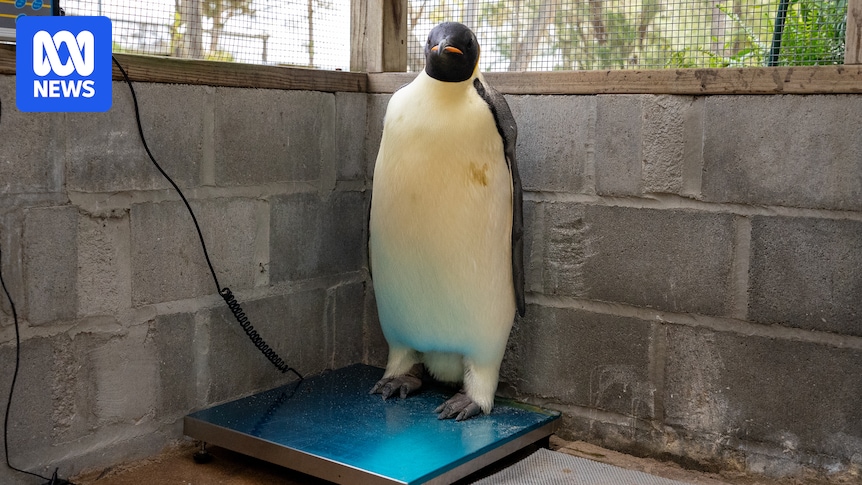A bird carer in Western Australia says it is a privilege to care for an emperor penguin which made headlines around the world after an epic journey crossing the Southern Ocean.
The penguin, which has gained the nickname Gus after Roman emperor Augustus, has been in the care of Albany’s Carol Biddulph since it was found malnourished on a West Australian beach a week ago.
Its 3,400-kilometre journey gained coverage across the world from the likes of CNN and The Times with the arrival near Denmark, about 400km south of Perth, the most northern sighting of the species.
The emperor penguin on Ocean Beach near Denmark on WA’s south coast. (Supplied: Aaron Fowler)
Ms Biddulph, a registered carer with the Department of Biodiversity, Conservation and Attractions (DBCA), said the bird was malnourished, with bones visible, when she first inspected it.
Despite years of experience caring for penguins she said manoeuvring the emperor penguin was quite an experience.
“Between the condition of the bird and the activity that might have happened [if it stayed] on the beach … I thought it was best to bring the bird in,” she said.
Wildlife carer Carol Biddulp is looking after the penguin. (Supplied: Miles Brotherson, DBCA)
“Getting it back to the car was quite a challenge.
“We got it into a carrier, a large canvas pet carrier, nice and soft, and got it into the car and home.”
The emperor penguin was weighed and given fluids after arriving at the care centre. (Supplied: Miles Brotherson, DBCA)
Adult male emperor penguins can grow up to 1.4 metres and weigh 40kg.
Gus weighs about 23kg.
“I have a dedicated penguin enclosure, of course. [But] I’ve never had to deal with a large penguin like this before,” Ms Biddulph said.
“The first thing to do with any wild animal is to weigh it. You need to know its weight so you can give it appropriate fluids and medication.
“Never in my wildest thoughts would I have thought I’d ever have an emperor penguin to care for.
“It’s just amazing. It’s such a privilege to be part of this bird’s journey.”
Gus is in the hands of a wildlife carer in Albany. (Supplied: Miles Brotherson, DBCA)
The bird’s enclosure includes cooling water misting jets.
Scientists remain stumped as to why it made the record journey across the the Southern Ocean far from its icy home, with emperor penguins endemic to Antarctica.
They are not normally found in Australia.
